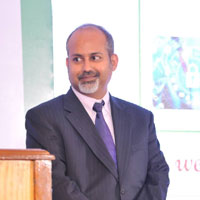
The IEEE Region 10 Symposium
Symposium Theme: Technological Innovation for Humanity
7-9 June 2019, at Kolkata, India
Research Issues in Security in Cyber-Physical Systems
Sandeep K. Shukla, FIEEE
Joint Coordinator
Interdisciplinary Center for Cyber Security
and Cyber Defense of Critical Infrastructures
Poonam and Prabhu Goel Professor and Department Head
Department of Computer Science and Engineering
Indian Institute of Technology Kanpur
https://security.cse.iitk.ac.in
Joint Coordinator
Interdisciplinary Center for Cyber Security
and Cyber Defense of Critical Infrastructures
Poonam and Prabhu Goel Professor and Department Head
Department of Computer Science and Engineering
Indian Institute of Technology Kanpur
https://security.cse.iitk.ac.in

Abstract:
Cyber Physical Systems are physical systems inextricably entangled with cyber based control - such as power plants, power transmission, distribution systems, water treatment plants, automated manufacturing systems etc. Such systems form the backbone of national wellbeing and are termed as national critical infrastructures. In today's cyber threat landscape, these systems are ripe targets of powerful cyber-attacks from nation states, hackers or cyber criminals. As a result, securing such systems is of paramount importance. Due to their cyber physical nature, the security problems germane to such systems are quite different from that of traditional ICT systems. The attack surfaces range from measurement instrumentation in the physical components, the industrial protocols and networks, the control systems, the actuators, and more depending on the span and functionality of the systems. Cyber-attacks on such systems have happened even for air-gapped facilities as seen in the case of the STUXNET attack on nuclear enrichment plant in Iran. Ukraine power system attacks are prime examples of cyber-attacks on power grid, and Ukraine water chlorination chemical plant attack attempt has been as recent as summer of 2018. How does one prepare for defending these systems? It requires proper risk modeling, malware and intrusion detection through machine learning, continuous surveillance and automated threat detection and prevention, systematic patching through real-time threat intelligence, dynamic adaptive cyber defense through run-time reconfiguration, and many such techniques. Cyber resilient design of such systems is even a better step towards preparedness. Awareness, and education is a significant component of the defense strategy as human computer interaction is more in such systems through human-in-the loop control architectures. In this talk, we present some of these burgeoning fields of cyber security research and discuss how the C3I Center at IIT Kanpur is putting some of these to practice.
Biography:
Professor Sandeep K. Shukla is an IEEE fellow, an ACM Distinguished Scientist, and served as an IEEE Computer Society Distinguished Visitor during 2008-2012, and as an ACM Distinguished Speaker during 2007-2014. He is currently the Editor-in-Chief of ACM Transactions on Embedded Systems, and associate editor for ACM transactions on Cyber Physical Systems. In the past, he has been associate editors for IEEE Transactions on Computers, IEEE Transactions on Industrial Informatics, IEEE Design & Test, IEEE Embedded Systems Letters, and many other journals. He has guest-edited more than 15 special issues for various IEEE and ACM journals. He has written or edited 9 books, published over 200 journal and conference papers. He has been program chairs for 4 IEEE/ACM International conferences, and General Chair for 2 of these conferences. He has served on the program committee of more than 100 international conferences and workshops. He supervised 12 PhDs, and directed five post-doctoral scholars at Virginia Tech. Sandeep's current research focus is on Cyber Security for Critical Infrastructures. He is coordinating a research center on cyber security for critical infrastructures along with his colleagues at IIT Kanpur at the moment. He received his bachelor’s degree in Computer Science and Engineering at Jadavpur University, Kolkata in 1991, his Masters and PhD degrees in Computer Science from the State University of New York at Albany, NY, USA in 1995 and 1997 respectively. He worked as a scientist at the GTE labs on telecommunications network management, distributed object technology, and event correlation technologies between 1997 and 1999. Between 1999 and 2001, he worked at the Intel Corporation on the formal verification of the ITANIUM processor, and on system level design languages. 2001-2002, he was a research faculty at the University of California at Irvine working on embedded system design. From 2002 till 2015, he has been an assistant, associate, and full professor at Virginia Tech, USA. He co-founded the Center for Embedded Systems for Critical Applications (CESCA) in 2007, and has been a director of the center between 2010 and 2012. In 2015, he joined the Computer Science and Engineering Department of the Indian Institute of Technology Kanpur, India. He is currently the Poonam and Prabhu Goel Chair Professor, and Dr.Deep Singh and Daljeet Kaur Faculty Fellow at IIT Kanpur. He is also the head of the Computer Science and Engineering department at IIT Kanpur, joint coordinator of the C3I Lab, and joint coordinator of the national block chain project. He received the Ramanujan Fellowship from the Science and Engineering Research Board, Government of India, the Presidential Early Career Award for Scientists and Engineers (PECASE) from the White House in 2004, Frederich Wilhelm Bessel Award in 2008 from the Humboldt Foundation, Germany, Virginia Tech Faculty Fellow Award, A distinguished Alumni Award from the State University of New York at Albany, A best paper award at the Asia-Pacific Design Automation Conference, GTE Laboratories Excellence Award,ASEE/ONR Faculty Fellowship in 2005, ASEE/Air Force Senior Faculty Fellowship in 2007, and an Air Force Labs Faculty Fellowship in 2008. Sandeep also has been a visiting faculty at INRIA, France, University of Kaiserslautern in Germany, MIT, and University of Birmingham UK for various periods of time.